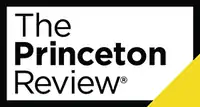The Princeton Review
The Princeton Review is a college admission services company offering test preparation services, tutoring and admissions resources, online courses, and books published by Penguin Random House. The company has more than 4,000 teachers and tutors in the United States and Canada and international franchises and offices in 21 countries.[1] The company is headquartered in New York City, and is privately held. Despite the title, it is not associated with Princeton University.[2]
 | |
| Type | Subsidiary |
|---|---|
| Industry | Education |
| Founded | 1981 |
| Founder | John Katzman, Adam Robinson |
| Headquarters | |
Key people | Joshua HJ Park, CEO |
| Owner | ST Unitas |
| Parent | ST Unitas |
| Divisions | College, Business School, Law School, Grad School, Med School |
| Website | www |
Corporate history
The Princeton Review was co-founded in 1981 by Adam Robinson and John Katzman, who—shortly after leaving college—taught SAT preparation to 15 students in New York City.[3] Katzman served as CEO until 2007, and was replaced by Michael Perik. In March 2010, Perik resigned and was replaced by John M. Connolly. In April 2010, the company sold $48 million in stock for $3 per share, and a short time later was accused of fraud in a class action suit filed by a Michigan retirement fund, which claimed The Princeton Review leadership exaggerated earnings to boost its stock price.[4] In 2012, the company was acquired by Charlesbank Capital, a private equity fund, for $33 million.[5] On August 1, 2014, the Princeton Review brand name and operations were bought for an undisclosed sum by Tutor.com, an IAC company, and Mandy Ginsburg became CEO. The company is no longer affiliated with its former parent, Education Holdings 1, Inc.[6] On March 31, 2017, ST Unitas [7] acquired the Princeton Review for an undisclosed sum.[8]
Test preparation

The Princeton Review offers test preparation courses, tutoring services, and or guidebooks for various tests via the Princeton Review website:[9]
- ACT
- Advanced Placement Exams (AP Exams)
- Chartered Financial Analyst (CFA® Level I)
- Chartered Financial Analyst (CFA® Level II)
- Dental Admission Test (DAT)
- GED
- Graduate Record Examination (GRE)
- ISEE
- Law School Admissions Test (LSAT)
- Medical College Admission Test (MCAT)
- NCLEX-RN
- Optometry Admission Test (OAT)
- PSAT
- SAT
- SAT Subject Tests
- Secondary School Admission Test
- SHSAT
- TOEFL
- United States Medical Licensing Examination
The company offers courses worldwide through company-owned and third-party franchises. Countries with Princeton Review franchises include Azerbaijan, Bahrain, Egypt, Hong Kong, India, Indonesia, Jordan, Kazakhstan, Kuwait, Lebanon, Malaysia, Mexico, Oman, Philippines, Qatar, Saudi Arabia, South Korea , Switzerland, Turkey, the United Arab Emirates and Vietnam.[10]
Criticisms
General
Test preparation providers have been criticized in the past on the grounds that their courses claim larger score increases than they deliver.[11]
Ranking schools
College rankings, including those published by the Princeton Review, have been criticized for failing to be accurate or comprehensive by assigning objective rankings formed from subjective opinions.[12] Princeton Review officials counter that their rankings are unique in that they rely on student opinion and not just on statistical data.[13][14]
In 2002 an American Medical Association affiliated program, A Matter of Degree,[15] funded by the Robert Wood Johnson Foundation, criticized the Princeton Review list of Best Party Schools.[16] USA Today published an editorial titled "Sobering Statistics"[17] in August 2002 and stated, "the doctor's group goes too far in suggesting that the rankings contribute to the problem (of campus drinking)." The editorial noted the fact that among the schools the AMA program was then funding as part of its campaign against campus drinking, six of 10 of those schools calling for The Princeton Review to "drop the annual ranking...had made (Princeton Review's) past top-party-school lists: many times for some. That's no coincidence." The editorial commended The Princeton Review for reporting the list, calling it "a public service" for "student applicants and their parents".
The Princeton Review rankings for LGBT-related lists were criticized in 2010 by a ranking competitor in The Advocate Magazine as inaccurate due to outdated methodologies.[18] The Princeton Review has always based its "LGBTQ-Friendly" and "LGBTQ-Unfriendly" [19] top twenty ranking lists on its tri-annual surveys of students at colleges profiled in the company's "Best Colleges" book which asks undergraduates: "Do students, faculty, and administrators at your college treat all persons equally regardless of their sexual orientations and gender identify/expression?" The Princeton Review also publishes The Gay & Lesbian Guide to College Life (2007). It has been available as an eBook since 2011.[20][21]
Privacy concerns
In 2016, the company was criticized by privacy rights advocates concerned that a company that owns online dating and college preparation services could amass data and exploit it in a way that preys on unsuspecting consumers, particularly younger people.[22] "Do parents know that when their underage kids enroll for exam prep or tutoring, personal information may be shared with hookup sites that could then target their kids to become customers?" asked the critic, who concluded that the company "makes no guarantee that data sharing among its entities will not include those customers whose sole aim is to improve their grades and test scores."[23] Indeed, another critic points out that The Princeton Review "policy states 'we may collect certain information from your computer each time you visit our site'—information like data 'regarding your academic and extracurricular activities and interests.' That information can be used to 'send you email notices and offers; perform research and analysis about your use of or interest in our products, services or products or services offered by others; [and] develop and display content and advertising tailored to your interests on our site and other sites.'"[24]
No evidence was ever presented that *IAC which owned The Princeton Review when these criticisms were made, used data gathered by The Princeton Review to promote IAC company dating services to younger people. This issue has been moot since 2017 when The Princeton Review was acquired by ST Unitas from IAC.
See also
References
- https://www.princetonreview.com/international/locations
- Princeton Review website, history
- Schonfeld, Zach (April 16, 2014). "Princeton Review Founder Blasts the SAT: 'These Tests Measure Nothing of Value'". Newsweek.com. Retrieved September 6, 2019.
Founded in 1981 by Katzman and Adam Robinson, the Princeton Review offers test preparation tutoring services, books and online courses, with franchises in 14 countries.
- "Investor Accuses Princeton Review Of Fraud". 360Law. 29 July 2011. Retrieved 9 August 2016.
- [ps://www.edsurge.com/news/2014-07-29-tutor-com-acquires-princeton-review "Tutor.com Acquires Princeton Review"]. EdSurge.com. 29 July 2014. Retrieved 9 August 2016.
- "IAC/InterActive Unit Agrees to Buy Princeton Review name". Wall Street Journal. 29 July 2014. Retrieved 29 July 2014.
- http://www.stunitas.com/front/about/en
- Hyo-Sik, Lee (February 14, 2017). "ST Unitas Acquires The Princeton Review". Korea Times. Retrieved 10 May 2018.
- "Official website". Retrieved 9 October 2014.
- International Offices of The Princeton Review at the Princeton Review website
- John Hechinger (May 20, 2009). "SAT Coaching Found to Boost Scores – Barely". The Wall Street Journal.
- Valerie Strauss. "U.S. News’s College Rankings Face Competition and Criticism", The Washington Post, 17 August 2008.
- "Robert Franek – author of The Best 377 Colleges". Retrieved 9 October 2014.
- "Best 380 Colleges Videos - The Princeton Review". www.princetonreview.com. Retrieved 2016-03-29.
- A Matter of Degree: Reducing High-Risk Drinking Among College Students(pdf), Robert Wood Johnson Foundation, March 23, 200
- End of Top Party School's Ranking?. The Early Show. CBS News. August 27, 2002. Retrieved on October 30, 2009.
- USA TODAY OPED Staff,"Sobering Statistics", USA Today, Aug. 20, 2002
- "Princeton Review's Approach is Outdated - Advocate.com". www.advocate.com. 2015-11-17. Retrieved 2016-03-29.
- "School Rankings". Retrieved 9 October 2014.
- "The Princeton Review". Retrieved 9 October 2014.
- Guide to College for LGBT Students. Princetonreview.com. Retrieved on 2013-08-02.
- The Mercury News, April 15, 2016, editorial by Ken McEldowney
- "Violating Privacy Is Bad Business". Townhall.com. 8 January 2016. Retrieved 8 June 2016.
- "Recent Online Dating Company IPO Raises Questions About Privacy". The Huffington Post. 24 February 2016. Retrieved 16 August 2016.